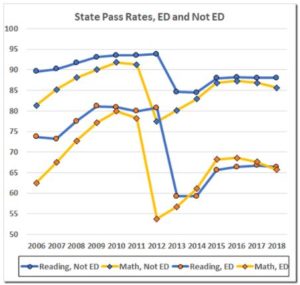I suspect John Butcher was writing tongue-in-cheek when he headlines his latest post on Cranky’s Blog, “Why Do the New Tests Punish the Poorer Kids?” As shown by the graph (left), when the Virginia Department of Education introduced new Standards of Learning (SOL) tests reflecting higher standards a few years ago, average test scores dropped for both students classified as disadvantaged (qualifying for free school lunches) and those not so qualified (referred to as non-disadvantaged). But scores dropped harder and further for the disadvantaged kids. The gap in pass rates between the two groups has increased from around 13 percentage points to about 20.
Far from “punishing” poor kids, as John is well aware, the revised SOLs simply exposed the true gap in learning that was taking place. “There is one obvious conclusion: Before the new tests, ED students did not perform as well as their more affluent peers,” John wrote. ” The new tests magnify that deficit.”
In a sense, the tests do punish school districts with large populations of economically disadvantaged kids. They look worse by comparison under the current testing regime. The Virginia Board of Education, he noted, abandoned a metric, Student Growth Percentiles, that measured students’ academic progress, creating an avenue for districts with a large percentage of poor kids to shine. I can’t begin to imagine why state officials jettisoned that measure.


Leave a Reply
You must be logged in to post a comment.